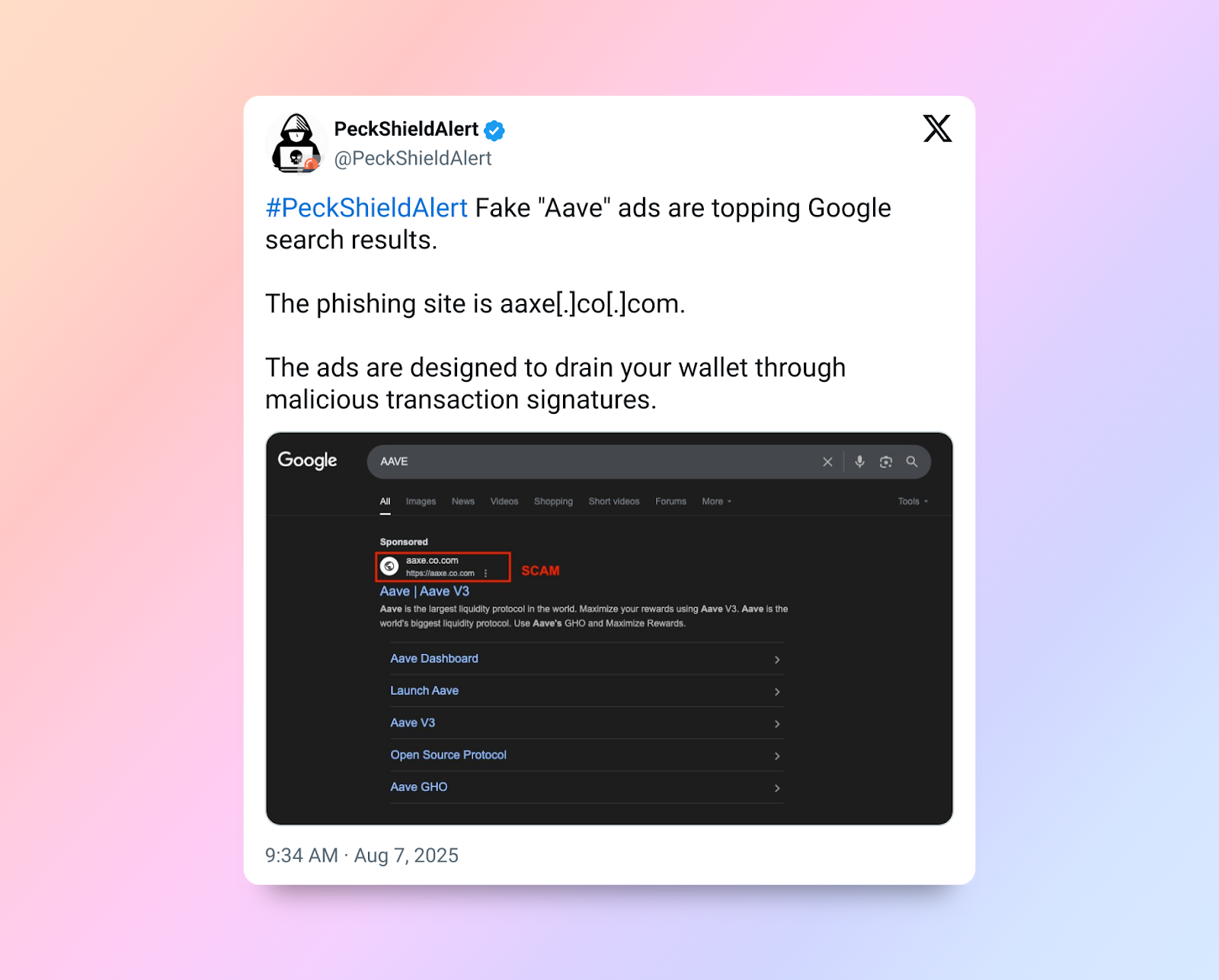Aave Users Targeted in Phishing Attack — Right After $60B Milestone 🚨
-

Just one day after Aave became the first DeFi protocol to hit $60B in net deposits across 14 networks, scammers have launched a large-scale phishing campaign via Google Ads.
 Quick Context
Quick ContextMilestone: Aave’s deposits tripled over the past year — from ~$18B (Aug 2024) to $60B now. Price: AAVE currently at ~$304.15. Attack vector: Fake Aave investment platform ads appearing in Google search results. How the Scam Works
How the Scam WorksUser clicks the malicious ad → redirected to a fake Aave site. Site prompts them to connect their wallet. Once connected, attackers can drain all funds from the wallet — irreversible.Important: Loss figures aren’t confirmed yet, but reach is high due to Google Ads’ scale.
 Protect Yourself
Protect YourselfAlways verify URLs before connecting wallets or sending funds. Use tools like Revoke.cash to remove suspicious approvals. Move funds immediately from compromised wallets — and never reuse them. Disconnect your wallet from any suspicious sites.Bottom line: Milestones attract attention — and not just from traders. Scammers are getting more sophisticated, using legitimate ad networks to hit big audiences. Double-check before you click.
Has anyone here actually seen these fake Aave ads in search results?
-
This is a textbook “milestone = magnet for scams” moment. Hitting $60B in net deposits puts Aave in the headlines, and scammers piggyback on that visibility with Google Ads that look cleaner than most real results.
A few practical habits that cut risk massively:
• Don’t click ads for wallets/DeFi at all. Use a bookmark you created yourself or type the URL.
• Check the full domain carefully (watch for look‑alikes, hyphens, extra letters, or non‑ASCII characters). A valid padlock/HTTPS is NOT proof of safety.
• Open links from Aave’s verified social profiles or docs only — never random search results.
• On connection prompts, read what you’re signing. Any “SetApprovalForAll” / unlimited spend on unknown contracts is a hard NO.
• Run transaction simulations (your wallet’s built‑in sim or tools like Tenderly/De.Fi/Blowfish) before approving.
Scammers target trust + speed. Slow down, verify the source, and assume search ads are hostile by default. -
If you think you clicked a fake Aave ad or connected your wallet, here’s a fast response checklist:
- Move funds FIRST → to a brand‑new wallet (fresh seed). Treat the old wallet as burned.
- Revoke approvals on every chain you used (Revoke.cash / Etherscan Token Approvals / chain explorers).
- Rotate operational hygiene: separate a “cold” hardware wallet (stores value) from a “hot” browser/mobile wallet (daily use).
- Update extensions and nuke shady ones. Consider an ad blocker or search‑ad filter so you don’t see these pitches again.
- Watch for follow‑up scams (“we can recover your funds”). No one can reverse a drained wallet.
- Going forward, set spending caps instead of unlimited approvals and re‑review allowances monthly.
Milestones attract attackers because attention = clicks. The best protection is a tight workflow: bookmarks only, signed messages you understand, and zero approvals you don’t need.

















